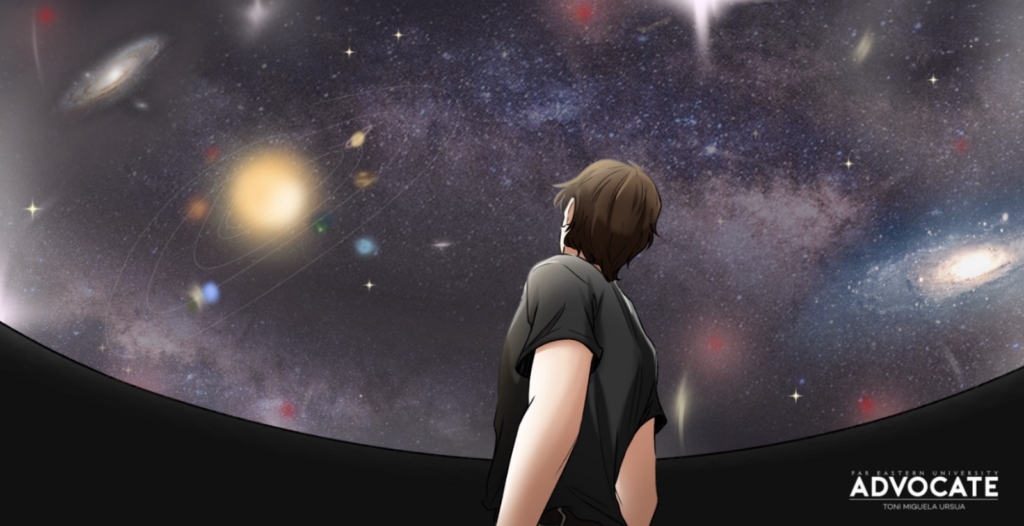
FEU remains unbeaten, gets mettle tested against Ateneo in UAAP thriller
- February 25, 2019 12:26
FEU Advocate
October 09, 2024 19:45

Even if the vast universe was said to be ever-expanding, for the first time, I felt suffocated.
The boundlessness of the great cosmos could have never been encapsulated in a pitch-black auditorium. Ironically, the projector itself blurred the celestial bodies through a light source other than a cluster of stars. I only got to distinguish the galaxies Andromeda and Canis Major Dwarf because of the lecturer; the same with the moons Juno and Ganymede. I am left in discomfort, puzzled that real stargazing requires lying down on uncomfortable soil instead of ergonomic movie seats.
After missing angles and corners like the grand universe, humanity's curiosity cannot dwell into highfalutin scales to measure the unreachable inside a miniature dome.
It is said that the universe hates being contained, and so it expands every moment. As it keeps expanding, astronomers and space fascinators continuously acquire room to name celestial bodies every millisecond where myriads are born. As it keeps expanding, observers continue needing more time to explore the interstellar heavens. As it keeps expanding, people continue reminding themselves that there are far more attainable objects than explaining something infinite.
As I try to map the universe, nebulae burst in my mind after realizing that it cannot be simplified.
Humans have crossed the line to quantify everything—I mean everything: 24 hours in a day on Earth; the speed of light at 299,792,458 m/s; 5.5 lightyears to reach Pluto; and the Hubble's constant at 73[(km/s)/Mpc].
The further we are from home, the more complex the definition and measurement of existence becomes. The rate of the universe’s expansion is unimaginably fast. It always feels like we are running out of time, as it ticks here on Earth, to discover every mystery lurking beyond the atmosphere. But maybe, the beauty of the cosmos does not need understanding or numbers. Maybe, celestial bodies just need our wonder in spite of its uncertainty.
I still crumble to think that one’s lifespan is not even enough to recall approximately 13.7 billion years of history unwritten. Forever is just such a long time I cannot catch… But in the end, I do not have to know everything and that's all right.
I can lose all of my breath trying to figure out if meteor showers are just the tears of every star that dies as a supernova; but I can also appreciate that the distance of Earth from the Sun is perfect for making it habitable so I can think about these questions. Even if I go beyond the books or LED screens of a planetarium, the midnight sky would not contain the reality check I wanted for my bucket list. Galaxies would remain blurry, nearby stars would continue fainting, and comets would still be racing in their orbits.
Every night, it was the same scene being immersed in the lights that took every chance for the stars to take the center stage. Human life does not depend on macroscales that define the universe through numbers and theories that just add to the confusion of existence.
Maybe, we just have to let the universe do its thing; to fill us with contentment and awe to enjoy life.
No matter if Hubble's constant surpasses my existence, I am at peace knowing that the cosmos would grant me the ultimate item on my bucket list: to just live; to be human—thriving in the planet I call ‘home.’
- Mark Vincent A. Durano
(Illustration by Toni Miguela Ursua/FEU Advocate)









